HP dm1z: Taking Fusion on the Road
by Dustin Sklavos on February 21, 2011 7:00 PM ESTBattery Life
The big news with Brazos, and by extension the HP dm1z, is the substantially improved battery life over Nile. While performance is nowhere near a strict win over that platform (Atom on the other hand...), power efficiency absolutely is. Take a look at this.
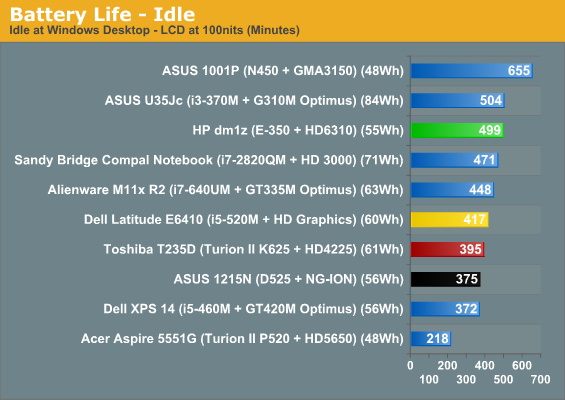

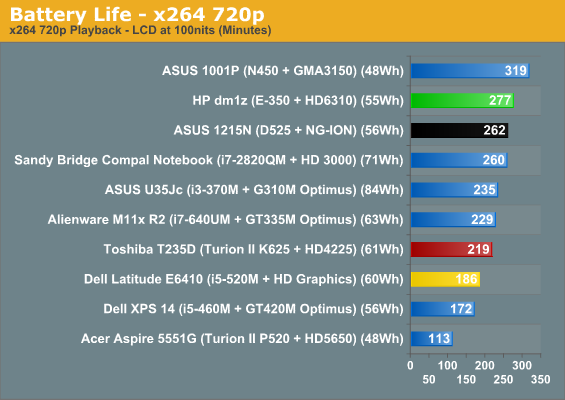
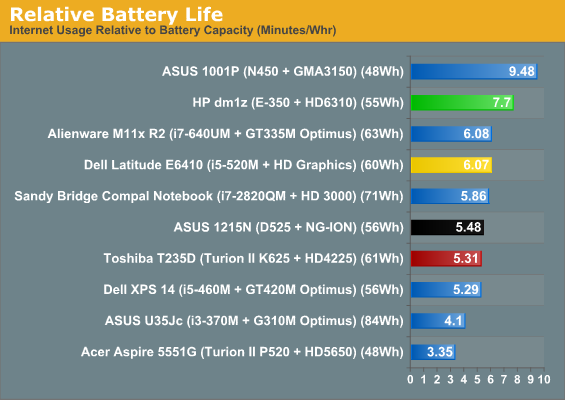
While portable gamers are probably still going to want to hang with Alienware's M11x, Brazos basically tells Intel's dual-core Atom to pound sand. The dm1z doesn't hit the battery life HP advertises (9.5 hours is pretty optimistic, probably only possible with wireless and Bluetooth disabled and the screen at the lowest brightness), but it still pulls more than seven hours of useful running time with a reasonable screen brightness and runs roughshod over Nile.
Heat and Noise
Unfortunately, where things get a little dicey (at least with the HP dm1z) is noise. First, the good news: heat output.
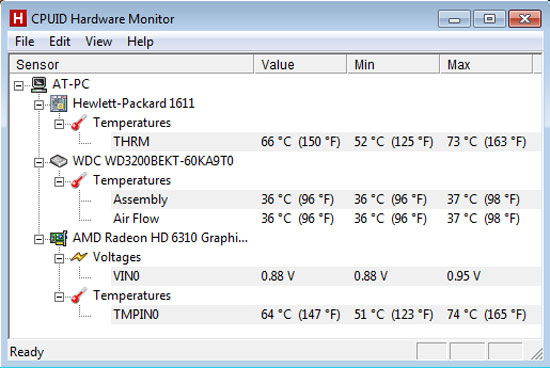
The internal components run at fairly reasonable temperatures, if a little on the high side, but fortunately those temperatures don't translate into an uncomfortable user experience. Quite the opposite in fact: the dm1z can happily be used on your lap without scalding you.
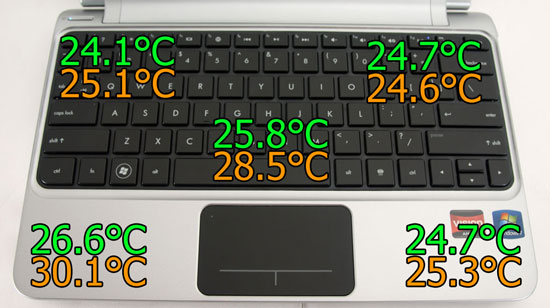
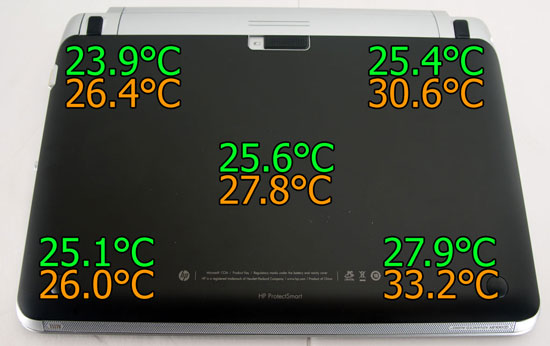
At idle the HP dm1z remains nice and frosty, and under sustained load the outside temperatures don't increase enough to make using the dm1z uncomfortable. But remember what I said about noise?
Part of the reason the dm1z is able to stay so comfortable is because the fan is almost constantly running. It's fairly low and not too obtrusive, but I have an AMD-based 15.6" Sony notebook on hand for review that runs quieter than the dm1z does at both idle and load. That may not be entirely fair because the 15.6" machine has more breathing room in the larger chassis, but it's nonetheless an issue. The fan in the dm1z doesn't spin up that much under heavy load, which would be more appreciated if HP was able to tune it to run just a little quieter at idle. This isn't make-or-break noise, but it's worth bringing up.
Update: Several of our readers pointed out that the HP dm1z has a utility called CoolSense as part of the HP Support Tools. It's supposed to allow some customization fan speeds to allow users to configure their laptop to prefer lower temperatures/higher noise, or lower noise/higher temperatures. As a matter of course we disable most of the manufacturer utilities to allow for optimal battery life results, so the above remarks reflect using the laptop without CoolSense enabled. Unfortunately, the dm1z has already been returned, so we are unable to run updated results. Anecdotally, noise is much better with CoolSense enabled.










108 Comments
View All Comments
ganeshts - Monday, February 21, 2011 - link
Not only is AMD late to the party, it is trying to come in after closing time!With the tablet craze about to take off following the year of the iPad, I am not even sure people want to throw away their money on anything so anaemic and running Windows...
JarredWalton - Monday, February 21, 2011 - link
Boo! Down with the naysayers! I'm honestly not really interested in tablets. They're fun gadgets to show things to people, but typing on them sucks. Add a separate keyboard, and now you're lugging around a laptop equivalent (that's still slower than any netbook, only with a somewhat optimized OS).Brazos finally makes netbooks viable as an overall computing platform. 7+ hours of battery life, performance that's substantially better than Atom (particular Atom on its own), and a reasonable cost. Maybe you'll get some decent HTPC setups with Brazos now... though honestly, I think for serious HTPC stuff like you test, you'll need something clocked quite a bit higher than the E-350's 1.6GHz.
StevoLincolnite - Monday, February 21, 2011 - link
I concur, I'm not interested in tablets running a mobile OS and ARM either.I've actually got myself a convertible netbook running Windows 7, I use it more in a laptop mode than a tablet mode.
I've got friends with an iPad and they say crazy things like: "It's changed my life!" (Really? It's just an over-sized iPod.)
The annoying part about Tablets I find is how bloody awkward they are to hold when you are sitting at something like a table where they can't hold themselves up and typing is well... Slow.
I say bring on Fusion, more performance at the low end is a good thing, just wish these manufacturers would start putting decent screens in mobile PC's.
mgl888 - Monday, February 21, 2011 - link
+1Tablets feel more like amusement devices at the moment. Without a keyboard and your standard applications, you really can't get much "work" done.
Rick83 - Tuesday, February 22, 2011 - link
A 5 inch tablet is so much more carryable and hence useable than a netbook, it's not even funny. The only netbook that really is worth any consideration is the insanely priced sony Z/V/P? series...the one with the 1600x768 screen.Cheap computing isn't really worth the trouble...
And as long as I need a separate bag to carry my on-the-go computer, it's really a no-go.
Visual - Tuesday, February 22, 2011 - link
Eh? A 5 inch tablet is almost insignificantly more usable than my 4 inch phone. It is redundant.Rick83 - Tuesday, February 22, 2011 - link
Actually, 5 inch is quite a bit larger than the 4" phone. It is the largest universally pocketable size I found, and I actually have a non-smart-phone (S40 based) so that some software issue won't shut me out from telephony (bodged firmware update still did exactly that even on the S40....) and so that I wont have to hold a giant screen thing to my ear, and have access to my organizer/internet while on the phone....Plus, my 5" tablet has suport for keyboard via bluetooth or usb, it has a mini-hdmi output which goes up to 720p, all of which is quite hard to find on a 4" phone.
And the screen surface is almost 50% larger. (20% in the diagonal should be 44% of the area) This makes reading much more comfortable. Also, the relaxed size and lack of 3G allow a higher power envelope for the SoC resulting in better performance.
acsa - Tuesday, February 22, 2011 - link
Amusement? It is very annoying to hold a tablet all the time during playing, movie watching, browsing, reading while sitting on any comfortable furniture. Even a 5 lbs brick on the lap is better. But even for sharing anything with others (also working thogether), while sitting at a desktop, a "standing-up" netbook/notebook is still much more comfortable. Of course, the are specific areas where the interface itself is very useful but at recent stage of software services I don't see many. And partial it is useful for portability if you have a lot of other luggage always carrying with you by foot. But that's again rare. Maybe where lack of cars and public transport is significant ;)FunBunny2 - Tuesday, February 22, 2011 - link
Until "pickable" apps are written for tablets, they won't really do much. The issue is whether developers will figure out how to data model "pickable" apps. RDBMS will do that, but most developers aren't smart enough.Powerlurker - Tuesday, February 22, 2011 - link
That's probably true, but I don't see how that's too big of a problem. Most consumers don't go home and type reports in their free time.